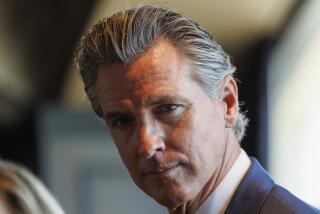Governor Fears Tax Talk Effects : Proposition 111: Timing of proposals to raise levies won’t help chances of gasoline increase in ballot measure, Deukmejian says.
- Share via
SACRAMENTO — Gov. George Deukmejian complained Tuesday that recent talk about raising taxes to balance the state and federal budgets is threatening the one tax increase he believes necessary: the phased-in, 9-cents-a-gallon gasoline tax hike contained in Proposition 111 to fund transportation projects.
Tax proposals put forward by Democratic gubernatorial candidates John K. Van de Kamp and Dianne Feinstein during their two debates, as well as talk of tax increases in Washington, is coming too close to the June 5 primary to suit him, the Republican governor said.
“The timing could not have been worse,” Deukmejian told a small group of reporters during an interview session in his cabinet room.
The way Deukmejian sees it, voters may be willing to go along with a tax increase if they know where the money is going to be spent. What they don’t like is providing money for general government services, which is what Feinstein and Van de Kamp are proposing, Deukmejian argued.
Voters, he said, “have to be convinced that their elected representatives are really giving them value for the dollar.” Deukmejian noted that Proposition 111 earmarks money from the gasoline tax for highway and transportation projects. Even so, he said, “There are still a lot of people who have a general distrust of government, and feel that the monies might get diverted.”
To allay voter fears, Deukmejian again pledged that he will oppose any general tax increases put forward by legislators attempting to solve the state’s $3.6-billion budget problem.
Deukmejian, one of the sponsors of Proposition 111, indicated that he is not happy with the way the campaign is going.
The chief executive said raising money for the measure has been “like pulling teeth,” even though he expects the campaign to hit its goal of $5 million.
Calling the campaign “very close,” Deukmejian said he and other advocates of Proposition 111 have to do a better job of “letting people know what it is all about.”
Revenue from the increased gas tax, if approved, would be used to build and upgrade state roads and highways and for mass transit projects throughout the state.
On other matters, Deukmejian said he has not decided what he will do after he leaves office next year, but he ruled out writing a book. “It probably would put everybody to sleep in a hurry,” said Deukmejian.
The governor also said he is disappointed with the workfare program, called Greater Avenues for Independence, that he was instrumental in creating. GAIN, which will cost an estimated $364 million in the new budget year, including state and federal funds, is aimed at giving welfare recipients job training and education skills to make them self-supporting. The idea was that the program would pay for itself. But, so far, that hasn’t happened.
Legislative Analyst Elizabeth G. Hill has cited the high costs and disappointing results of GAIN as a factor contributing to the current budget problem.
Deukmejian refused to call GAIN a flop, but he conceded, “It is a fair conclusion that the savings are not what they were anticipated.”
The governor also said he would not propose a cut in state aid to public schools to help solve the budget problem. But he said he might consider such a cut if it is proposed by one of the participants in a series of private budget talks he is carrying on with legislative leaders. Public school funding is guaranteed under voter-approved Proposition 98, but that guarantee can be suspended for a year in times of emergency.
More to Read
Get the L.A. Times Politics newsletter
Deeply reported insights into legislation, politics and policy from Sacramento, Washington and beyond. In your inbox twice per week.
You may occasionally receive promotional content from the Los Angeles Times.










